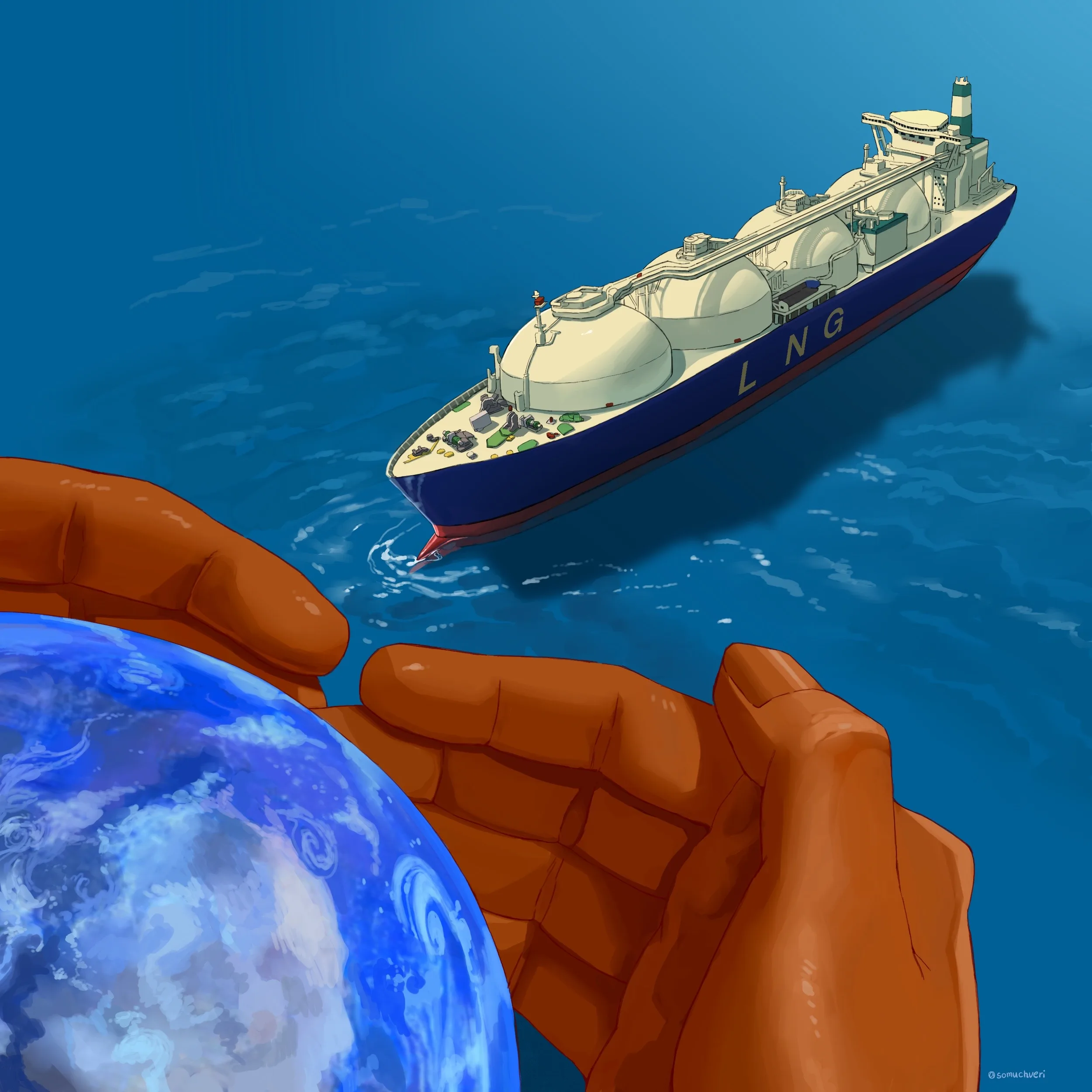New Global Campaign Launches on April Fools’ Day: Pulls Back the Curtain on Dirty Shipping Fuels
This April Fools’ Day the Say No To LNG campaign launched across the globe,
pulling back the curtain on dirty shipping fuels and calling attention to one in particular: Liquefied
Natural Gas (LNG).

This April Fools’ Day the Say No To LNG campaign launched across the globe, pulling back the curtain on dirty shipping fuels and calling attention to one in particular: Liquefied Natural Gas (LNG). The launch is marked by several events in North America, Europe, East and Southeast Asia, and other regions.
LNG is being greenwashed in the shipping sector as a “climate friendly” alternative to conventional marine fuels. Proponents claim LNG produces less carbon emissions and is a low-risk pathway towards shipping decarbonization. Say No To LNG is setting the record straight: LNG is a dangerous climate pollutant that poses risks to nature, public safety, and health.
The name “natural gas” can portray LNG as a clean energy source, but it’s predominantly composed of methane – a greenhouse gas that is 80 times more powerful at warming our atmosphere than carbon dioxide (CO2 ).
Ships are responsible for transporting 90% of our global trade. With no international regulations, methane emissions from LNG-fueled ships increased by 150% between 2012 and 2018. Say No To LNG is imploring the shipping sector and policymakers to urgently rule out LNG from all shipping decarbonisation pathways.
If global methane emissions are reduced by 45%, we could prevent 260,000 premature deaths, 775,000 asthma-related hospital visits, 73 billion hours of lost labor from extreme heat, and 25 million tonnes of crop losses every year!
Investing in LNG is financially risky: from geopolitical instabilities, skyrocketing LNG prices and public pressure from climate advocates to international methane regulations on the horizon, investors and financiers are already pulling out of LNG projects. A recent study shows, as countries move towards zero-emissions fuels, the value of stranded assets – in LNG-fuelled ships – will be up to $850 billion in 2030.
Using LNG as a marine fuel will only move us closer to our climate tipping points. LNG will not deliver emissions reductions for the shipping sector that are demanded by the Paris Agreement: a legally-binding international treaty on climate change to keep global warming below 1.5°C. LNG in the shipping sector is a dead-end solution.
“Say No To LNG will bring public awareness to the detrimental community and climate impacts of LNG in regions across the globe. We are fostering collaboration with policymakers, financial institutions, the shipping industry, knowledge holders, scientists, NGOs and grassroots organizers to build opposition to LNG expansion and new projects, and collectively move towards zero-emissions solutions.”
–Elissama Menezes, Campaign Director, Say No To LNG – Global“Whether it’s farmers living on poisoned lands where natural gas is fracked, methane leaking from gas-powered ships that overheats our planet, or children with asthma breathing polluted air from gas stoves, LNG harms our health at every step along the supply chain. For public safety and public health, CAPE calls for a rapid phase-out of the production and use of natural gas across every industry.”
–Dr. Melissa Lem, President, Canadian Association of Physicians for the Environment (CAPE)“The flood of LNG that exporters want to pour into countries like the Philippines goes against our development, energy security, public health, and climate interests. When there is an abundant supply of renewables we could instead be tapping, why must we suffer polluting and climate destructive LNG?”
–Gerry Arances, Executive Director, Center for Energy, Ecology, and Development (CEED) & Convenor, Southeast Asia Working Group on Fossil Gas and Energy TransitionSay No To LNG is a global campaign mobilizing stakeholders towards an LNG-free shipping industry. The campaign supports solutions for shipping decarbonization that take a lifecycle approach, go beyond fuel solutions – including operational and efficiency measures, meet international climate commitments, and align with a just and equitable transition.
For more information, visit www.saynotolng.org.
For media Inquiries please contact [email protected].